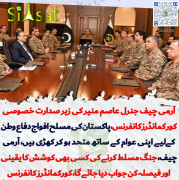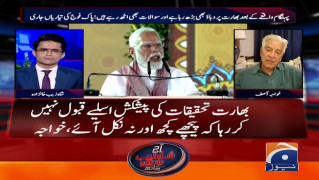Night_Hawk
Siasat.pk - Blogger
Posted by Usman 29 June, 2011

NEW YORK: When President Barack Obama cited cost as a reason to bring troops home from Afghanistan, he referred to a $1 trillion price tag for Americas wars, but the total bill for wars in Iraq, Afghanistan and Pakistan to the U.S. Treasury will run at least $3.7 trillion plus the costs yet to come, according to a study released on Wednesday.
The final bill will run at least $3.7 trillion and could reach as high as $4.4 trillion, according to the research project Costs of War by Brown Universitys Watson Institute for International Studies.
In the 10 years since U.S. troops went into Afghanistan to root out the al Qaeda leaders behind the Sept. 11, 2001 attacks, spending on the conflicts totaled $2.3 trillion to $2.7 trillion.
Those numbers will continue to soar when considering often overlooked costs such as long-term obligations to wounded veterans and projected war spending from 2012 through 2020. The estimates do not include at least $1 trillion more in interest payments coming due and many billions more in expenses that cannot be counted, according to the study.
In human terms, 224,000 to 258,000 people have died directly from warfare, including 125,000 civilians in Iraq. Many more have died indirectly, from the loss of clean drinking water, healthcare, and nutrition. An additional 365,000 have been wounded and 7.8 million people equal to the combined population of Connecticut and Kentucky have been displaced.
On the other hand, Sept. 11, 2001 nineteen hijackers plus other al Qaeda plotters spent an estimated $400,000 to $500,000 on the plane attacks that killed 2,995 people and caused $50 billion to $100 billion in economic damages. What followed were three wars in which $50 billion amounts to a rounding error. For every person killed on Sept. 11, another 73 have been killed since. Was it worth it? That is a question many people want answered, said Catherine Lutz, head of the anthropology department at Brown and co-director of the study. What did the United States gain for its trillions? It also raises the question of what the United States gained from its multi trillion-dollar investment.
I hope that when we look back, whenever this ends, something very good has come out of it, Senator Bob Corker, a Republican from Tennessee, told Reuters in Washington.
Strategically, the results for the United States are mixed. Osama bin Laden and Saddam Hussein are dead, but Iraq and Afghanistan are far from stable democracies. Iran has gained influence in the Gulf and the Taliban, though ousted from government, remain a viable military force in Afghanistan.
The United States has been extremely successful in protecting the homeland, said George Friedman, founder of STRATFOR, a U.S.-based intelligence company. Al Qaeda in Afghanistan was capable of mounting very sophisticated, complex, operations on an inter-continental basis. That organization with that capability has not only been substantially reduced, it seems to have been shattered, Friedman said.
Economically, the results are also mixed. War spending may be adding half a percentage point a year to growth in the gross domestic product but that has been more than offset by the negative effects of deficit spending, the report concludes.
Costs of War brought together more than 20 academics to uncover the expense of war in lives and dollars, a daunting task given the inconsistent recording of lives lost and what the report called opaque and sloppy accounting by the U.S. Congress and the Pentagon.
The report underlines the extent to which war will continue to stretch the U.S. federal budget, which is already on an unsustainable course due to an aging American population and skyrocketing healthcare costs.
http://www.columnpk.com/war-on-terror-cost-3-7-trillion-258000-lives/

NEW YORK: When President Barack Obama cited cost as a reason to bring troops home from Afghanistan, he referred to a $1 trillion price tag for Americas wars, but the total bill for wars in Iraq, Afghanistan and Pakistan to the U.S. Treasury will run at least $3.7 trillion plus the costs yet to come, according to a study released on Wednesday.
The final bill will run at least $3.7 trillion and could reach as high as $4.4 trillion, according to the research project Costs of War by Brown Universitys Watson Institute for International Studies.
In the 10 years since U.S. troops went into Afghanistan to root out the al Qaeda leaders behind the Sept. 11, 2001 attacks, spending on the conflicts totaled $2.3 trillion to $2.7 trillion.
Those numbers will continue to soar when considering often overlooked costs such as long-term obligations to wounded veterans and projected war spending from 2012 through 2020. The estimates do not include at least $1 trillion more in interest payments coming due and many billions more in expenses that cannot be counted, according to the study.
In human terms, 224,000 to 258,000 people have died directly from warfare, including 125,000 civilians in Iraq. Many more have died indirectly, from the loss of clean drinking water, healthcare, and nutrition. An additional 365,000 have been wounded and 7.8 million people equal to the combined population of Connecticut and Kentucky have been displaced.
On the other hand, Sept. 11, 2001 nineteen hijackers plus other al Qaeda plotters spent an estimated $400,000 to $500,000 on the plane attacks that killed 2,995 people and caused $50 billion to $100 billion in economic damages. What followed were three wars in which $50 billion amounts to a rounding error. For every person killed on Sept. 11, another 73 have been killed since. Was it worth it? That is a question many people want answered, said Catherine Lutz, head of the anthropology department at Brown and co-director of the study. What did the United States gain for its trillions? It also raises the question of what the United States gained from its multi trillion-dollar investment.
I hope that when we look back, whenever this ends, something very good has come out of it, Senator Bob Corker, a Republican from Tennessee, told Reuters in Washington.
Strategically, the results for the United States are mixed. Osama bin Laden and Saddam Hussein are dead, but Iraq and Afghanistan are far from stable democracies. Iran has gained influence in the Gulf and the Taliban, though ousted from government, remain a viable military force in Afghanistan.
The United States has been extremely successful in protecting the homeland, said George Friedman, founder of STRATFOR, a U.S.-based intelligence company. Al Qaeda in Afghanistan was capable of mounting very sophisticated, complex, operations on an inter-continental basis. That organization with that capability has not only been substantially reduced, it seems to have been shattered, Friedman said.
Economically, the results are also mixed. War spending may be adding half a percentage point a year to growth in the gross domestic product but that has been more than offset by the negative effects of deficit spending, the report concludes.
Costs of War brought together more than 20 academics to uncover the expense of war in lives and dollars, a daunting task given the inconsistent recording of lives lost and what the report called opaque and sloppy accounting by the U.S. Congress and the Pentagon.
The report underlines the extent to which war will continue to stretch the U.S. federal budget, which is already on an unsustainable course due to an aging American population and skyrocketing healthcare costs.
http://www.columnpk.com/war-on-terror-cost-3-7-trillion-258000-lives/





























